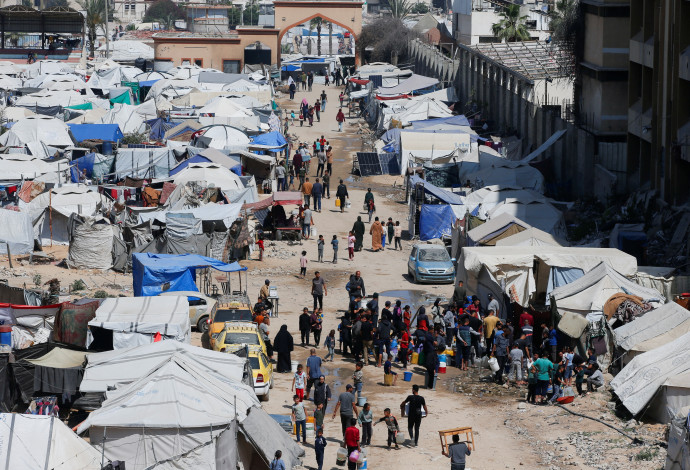
Behind the Message to Washington: Qatar Is Using Humanitarian Aid To Attack Israel
The negotiations in Doha did not succeed. They broadcast the message in Doha that they were not tired of trying to reach an agreement, but this message was meant for American ears. Qatar succeeded in being depicted in Washington as the party capable of advancing a ceasefire both in the Israel-Iran war and in the Congo, two arenas that were significant for the Trump administration.
The visit by the Qatar prime minister to the White House was intended to advance the agreement with Iran and also with Gaza and, therefore, it was important for Qatar to show the Americans that it is capable of reaching an agreement, even in Gaza. In any case, pursuant to Steve Witkoff’s announcement, there were also reports that Qatar was disappointed and angry with Hamas.
That said, the official reaction from Qatar avoided any criticism of Hamas. In a speech before the academic forum at Cambridge University toward the collapse of the talks, the Qatari foreign minister accused Israel of sabotaging the negotiations.
At the same time, Qatar still hosted and supported Hamas officials and even allowed them to present their narrative more vigorously. Both Khalil Al-Hayya and Ghazi Hamad spoke from Doha, with Qatar media echoing their messages. Qatar media also promoted the starvation campaign in Gaza with well-produced, emotional reports by Anis Al-Sharif on Al Jazeera conveying the story that Hamas sought to present to pressure Israel.
Accordingly, the Qatar minister for international cooperation, an activist figure in the Qatar foreign service, promoted these messages of starvation in Gaza. This message didn't only attack Israel. On Al Jazeera, Jamal Rayyan broadcast biting criticism of Egyptian leadership for inaction on Gaza. The Qatar network further accused Egypt of throwing bottles into the sea hoping they would reach the Gazans.
Similarly, Al-Hayya’s speeches from Qatar even called for the Egyptian and Jordanian people to engage in a “popular awakening” to the situation in Gaza, much to the dissatisfaction of Cairo and Amman, which do not wish to see disorder in their territories.
Qatar used these same two countries, Egypt and Jordan, yesterday to bring 49 trucks into the Gaza Strip, trucks that contained sacks of wheat and baskets of food for specific families, according to official Qatari reports. In the case of Qatar, it is worth checking where this aid went. Tractors flying the Qatar flag brought in several months ago via the Egyptian border were the same type that were used in the Oct. 7 attack on Israel.
In the same way, one should note that Qatari initiatives such as Al-Fakhuri, the education fund promoted by the emir’s mother, Sheikha Moza, is still asactive in the Gaza Strip as it was before Oct. 7. This is despite the fact that Hamas’ use of educational institutions in Gaza is a phenomenon that the Israeli Defense Fund showed again and again. It is logical to assume this was with clear Qatari agreement.
Hamas used the education fund and other funds supported by Sheikha Moza as humanitarian cover in order to vilify Israel from various public platforms throughout the war. In the same way, at yesterday’s Arab League staff seminar on the role of the International Criminal Court against “Israeli crimes of occupation in the occupied Palestinian territories,” Qatar media highlighted the participation of the delegation from Doha.
This reflected Qatari activism in international forums as well. At the same time as negotiations continued in Doha, Qatar participated in a meeting of 30 countries in Bogota, Colombia, to promote sanctions on Israel. Similarly, Qatar sought ways to punish Israel even in international forums that have no direct connection to Israel.
Qatar’s membership in the organization to ban chemical weapons allowed it to demand a discussion of Israeli attacks in Syria. Qatar justified this with the fact that Israeli attacks against the backdrop of events in Suwayda damaged the Ministry of Defense in Damascus and, therefore, delayed the arrival of international inspectors to verify the removal of chemical weapons stockpiles. In the past, the Syrian Defense Ministry has found other excuses to delay visits by inspectors; however, this time the delay was a Qatari excuse to attack Israel.
In these four arenas, Qatari policy has been highlighted by using the humanitarian pretext to strengthen terrorist organizations and attack Israel. Doha’s policy here is wonderfully effective.


